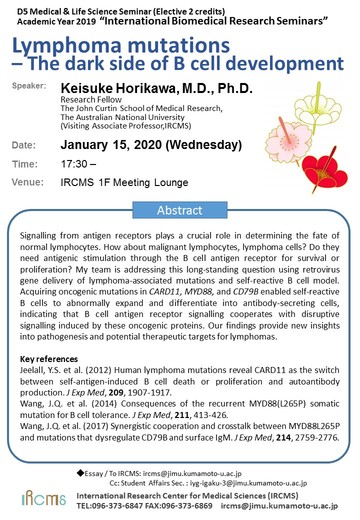- HOME
- News & Events
- [JAN 15] D5 Medical & Life Science Seminar-Dr. Keisuke Horikawa, ANU
News & Events
[JAN 15] D5 Medical & Life Science Seminar-Dr. Keisuke Horikawa, ANU
December 19 2019
The "D5 Medical & Life Science Seminar" course will be offered by International Research Center for Medical Sciences (IRCMS). It will run from April 2019 to March 2020, with lectures given by scientists who are affiliated with IRCMS or in collaboration with researchers at IRCMS. The lectures will be given once a month, in English, and by leading scientists in the relevant research field. Students will be taught: 1) how normal physiological functions are maintained in the human body; 2) how abnormalities in these systems (e.g., cancer) are studied using experimental models; 3) cutting-edge technologies (including single cell level imaging and omics analysis) used for mechanistic understanding of these abnormalities; 4) efforts and progresses in finding cure for human diseases associated with these abnormalities; and 5) importance of understanding disease mechanisms using cross-disciplinary approaches.
Date : January 15, 2020 (Wednesday)
Time : 17:30 -
Venue : IRCMS 1F Meeting Lounge
Speaker : Keisuke Horikawa, M.D., Ph.D.
Research Fellow
The John Curtin School of Medical Research,
The Australian National University
(Visiting Associate Professor, IRCMS)
Title : Lymphoma mutations - The dark side of B cell development
Abstract :
Signalling from antigen receptors plays a crucial role in determining the fate of normal lymphocytes. How about malignant lymphocytes, lymphoma cells? Do they need antigenic stimulation through the B cell antigen receptor for survival or proliferation? My team is addressing this long-standing question using retrovirus gene delivery of lymphoma-associated mutations and self-reactive B cell model. Acquiring oncogenic mutations in CARD11, MYD88, and CD79B enabled self-reactive B cells to abnormally expand and differentiate into antibody-secreting cells, indicating that B cell antigen receptor signalling cooperates with disruptive signalling induced by these oncogenic proteins. Our findings provide new insights into pathogenesis and potential therapeutic targets for lymphomas.
Key references
Jeelall, Y.S. et al. (2012) Human lymphoma mutations reveal CARD11 as the switch between self-antigen-induced B cell death or proliferation and autoantibody production. J Exp Med, 209, 1907-1917.
Wang, J.Q. et al. (2014) Consequences of the recurrent MYD88(L265P) somatic mutation for B cell tolerance. J Exp Med, 211, 413-426.
Wang, J.Q. et al. (2017) Synergistic cooperation and crosstalk between MYD88L265P and mutations that dysregulate CD79B and surface IgM. J Exp Med, 214, 2759-2776.

